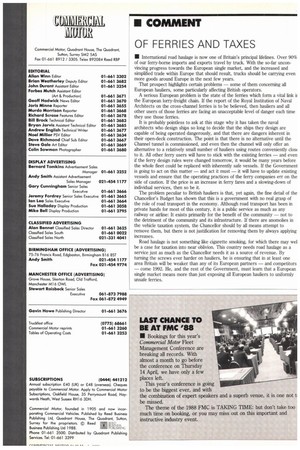OF FERRIES AND TAXES
Page 5

If you've noticed an error in this article please click here to report it so we can fix it.
• International road haulage is now one of Britain's principal lifelines. Over 90% of our ferry-borne imports and exports travel by truck. With the so-far unconvincing progress towards the European single market, and the increased and simplified trade within Europe that should result, trucks should be carrying even more goods around Europe in the next few years.
That prospect highlights certain problems — some of them concerning all European hauliers, some particularly affecting British operators.
A serious European problem is the state of the ferries which form a vital link ii the European lorry-freight chain. If the report of the Royal Institution of Naval Architects on the cross-channel ferries is to be believed, then hauliers and all other users of those ferries are facing an unacceptable level of danger each time they use those ferries.
It is probably pointless to ask at this stage why it has taken the naval architects who design ships so long to decide that the ships they design are capable of being operated dangerously, and that there are dangers inherent in their open-deck construction. The point is that there is no alternative until the Channel tunnel is commissioned, and even then the chunnel will only offer an alternative to a relatively small number of hauliers using routes conveniently closi to it. All other ferry users will have to stick with the existing ferries — and even if the ferry design rules were changed tomorrow, it would be many years before the whole fleet could be replaced with inherently safe vessels. If the Govemmen1 is going to act on this matter — and act it must — it will have to update existing vessels and ensure that the operating practices of the ferry companies err on the side of caution. If the price is an increase in ferry fares and a slowing-down of individual services, then so be it.
The problem peculiar to British hauliers is that, yet again, the fine detail of the Chancellor's Budget has shown that this is a government with no real grasp of the role of road transport in the economy. Although road transport has been in private hands for most of this century, it is a public service as much as any railway or airline: It exists primarily for the benefit of the community — not to the detriment of the community and its infrastructure. If there are anomolies in the vehicle taxation system, the Chancellor should by all means attempt to remove them, but there is not justification for removing them by always applying increases.
Road haulage is not something like cigarette smoking, for which there may wet be a case for taxation into near oblivion. This country needs road haulage as a service just as much as the Chancellor needs it as a source of revenue. By turning the screws ever harder on hauliers, he is ensuring that in at least one area Britain will be weaker than any of its European partners — and competitors — come 1992. He, and the rest of the Government, must learn that a European single market means more than just exposing all European hauliers to uniformly unsafe ferries.
















































































































